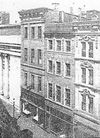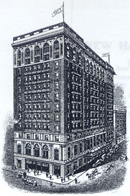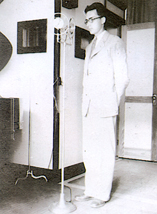|















©
1999-2025
Man From Mars Productions

|
| |
May
3, 1922 - The Meriden Daily Journal newspaper
reported that a certificate of organization had been filed with
Connectidut's secretary of state. It created the Doolittle Radio
Corp of New Haven whose president and treasurer was Franklin
M. Doolittle; the secretary was his sister, Pauline N. Doolittle;
and a director was John H. Hineman Jr. The Hartford Daily
Courant version of this article, published on April 22, said
the new corporation had issued $50,000 in capital stock and began
business with $3,000 cash. It said director Hineman lived
in West Point, NY. [The Yale University directory
for 1919-1920 indicates John Hartwell Hinemon Jr. was a 1912
graduate of the U.S. Military Academy at West Point and lived in
New Haven's Duncan Hotel. He was studying electrical engineering.
The 1920 US Census for New Haven indicates that John H. Hineman,
and his wife Mildred, were boarders on Chapel Street. Hineman was
a commisioned officer in the U.S. Army. Other research indicates
he served in the Army Signal Corps during World War I, retiring
as a full colonel.]
November
27, 1922 - Radio Inspector Walter Butterworth travelled
from Boston to personally inspect Franklin M. Doolittle's radio
appartus at 817 Chapel Street in New Haven. He liked what he saw,
recommending that the U.S. Commerce Department's Bureau of Navigation
grant a Class A Limited Commercial license. The paperwork was approved
in Washington on December 2nd and a three-month license was granted.
click
to see a portion of WPAJ's first commercial license application
December
10, 1922 - Above a shop in New Haven, Connecticut's first
commercial radio station was born: 30-watt WPAJ (360 meters/833
kilocycles). Working in cramped quarters, Doolittle was President
& Treasurer of Doolittle Radio Corporation.
|
|
| |

click
for enlargement |
The very first performer on the young station was Miss Florence
A. Morrison, a New Haven school music teacher. For the opening broadcast,
she presented a program of piano music (note the player roles atop
the piano).
April,
1923 - WPAJ changed its wavelength to 268 meters
(1120 kc).
|

click
for enlargement |
|
| |
October, 1923 - New Haven native Italo
A. Martino joined Doolittle to sell radio sets. He later became
an officer of the company.
January
1, 1924 - WPAJ's three-month license renewal form
indicated Doolittle Radio Corporation had relocated to 109 Crown
Street. Only one 85-foot wooden tower was in use and permission
was granted to boost power output to 100 watts.
1924
- Doolittle hires Walter B. Haase
to sell and install radio sets. The collaboration would continue
until 1959.
|
May
23, 1924 - Another license renewal application
indicated Doolittle had relocated to 115 Crown Street. A two-tower
array was again in use, each 85 feet in height.
August
6, 1924 - The Bureau of Navigation's Radio Division
authorized WPAJ to conduct duplex (binaural) broadcasts
on two frequencies - 268 & 227 meters (1120 & 1320 kc). The
same program was broadcast over both, with two microphones
feeding the two transmitters. "Listeners were invited to
join in the experiments in such unheard of things as stereo
broadcasting, years before there were any stereo records."
Click to read
a 1952 article by Doolittle explaining binaural broadcasting.
|
 |
 |
December 10, 1924 - The quarterly license renewal
directed WPAJ to broadcast only on 268 meters (1120
kc).
February
21, 1925 - WPAJ's call letters were changed
to WDRC (Doolittle Radio Corporation).
November
15, 1926 - WDRC was one of sixteen charter affiliates
of the new National Broadcasting Company. The affiliation
ended in March, 1927.
early
1927 - WDRC moved to the luxurious Hotel
Taft at 70 College Street in New Haven.
June
15, 1927 - Power was increased to 250 watts and
the frequency moved to 1090 kc, sharing the frequency with
WCAC Storrs, CT. WCAC moved to another frequency August 27th.
|
|
August 15, 1927 - The transmitter was moved to
5 Beacon Avenue, Beacon Hill, New Haven and the frequency
changed to 1060 kc (283 meters).
November
3, 1927 - WDRC broadcast with 500 watts
of power. WAIU, Columbus, OH, shared the frequency with 5,000
watts. To eliminate heterodyne, WDRC employed a "zero
beat" method whereby it was synchronized with the Columbus
station. Doolittle received permission from the Federal Radio
Commission to operate two hours nightly on 810 kc (370.2 meters)
until December 31. This frequency was shared with WMCA in
Hoboken, NJ. While 70 miles apart, the stations broadcast
the same program identically on the same wavelength.
January,
1928 - WDRC was on the air from 70 College
Street in New Haven six hours a day (9:30-10:30AM,
11:00AM-12:00N & 5:00-9:00PM). It was affiliated with
the WMCA Network, originating at New York's Hotel McAlpin.
WDRC employed five people (total weekly payroll $300)
and reported an annual net income of $18,700.
November
11, 1928 - A national frequency reallocation program
relocated WDRC to 1330kc.
|

Walter
B. Haase
announcing at 70 College
Street, circa 1927
|
|
|







